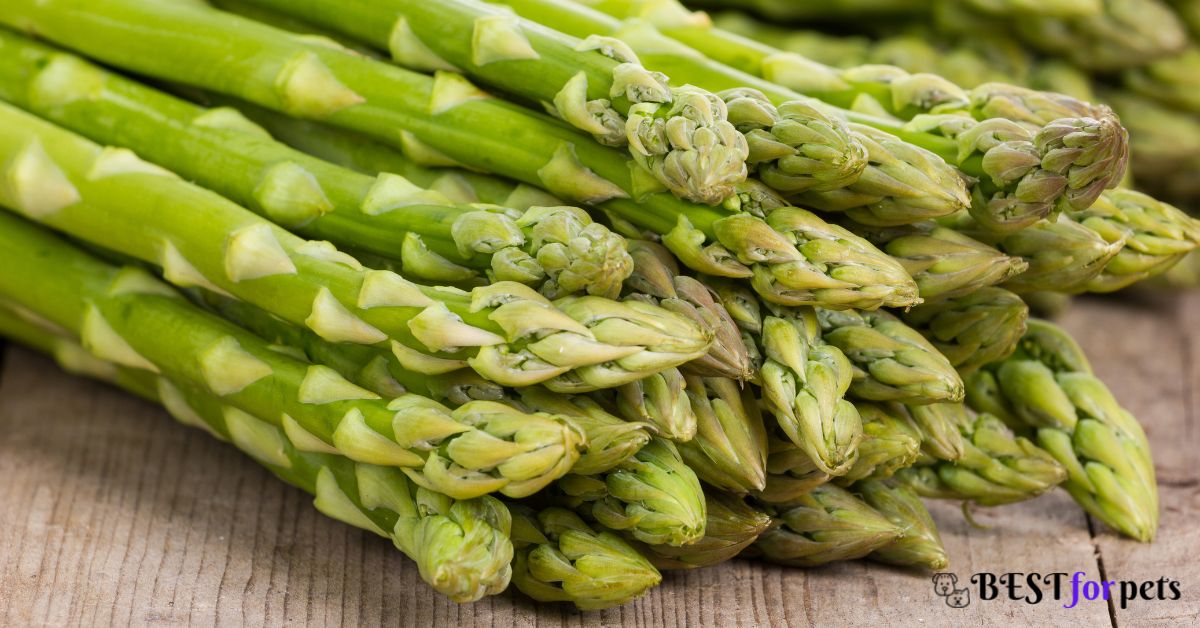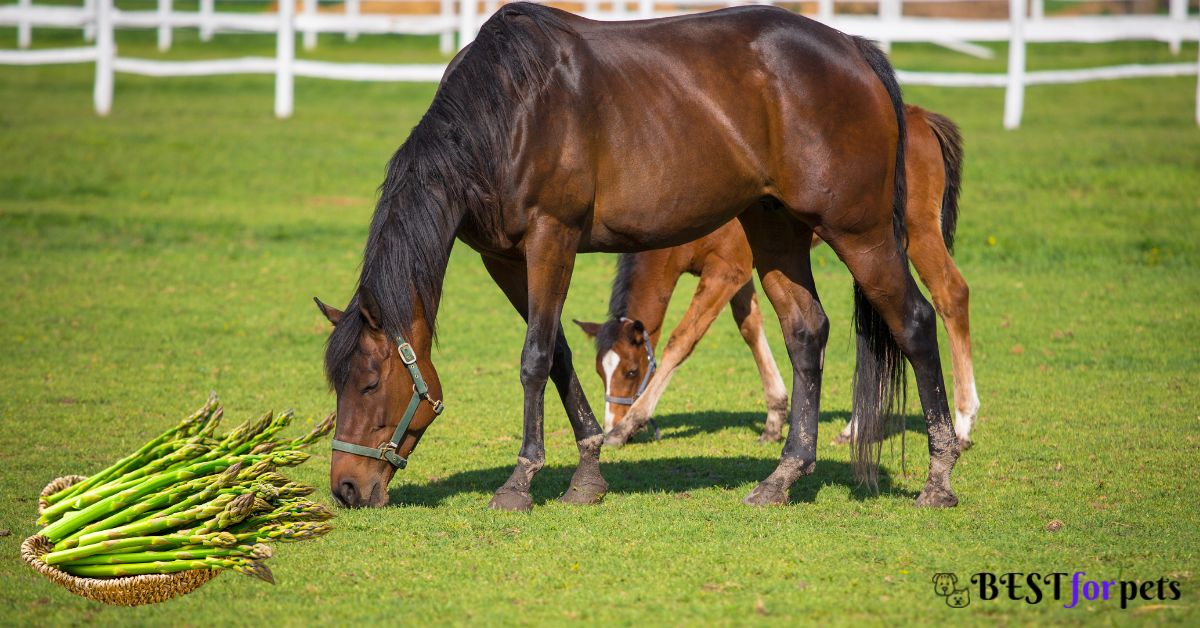Asparagus is a delicious and nutritious vegetable that has been enjoyed by humans for centuries. With its numerous health benefits and culinary versatility, it’s natural to wonder if horses can also indulge in this green delicacy.
In this comprehensive blog post, we will delve into the topic of whether Can Horses Eat Asparagus?, exploring its nutritional value, potential benefits, considerations, and any risks involved. So, let’s saddle up and explore the world of horses and asparagus!
Can Horses Eat Asparagus?
Yes, horses can eat asparagus, but it should be introduced gradually and in moderation. Cooked asparagus is easier for horses to digest. Monitor your horse’s response and consult a veterinarian if any issues arise.
Factors to Consider Before feeding Asparagus to Horses
Before feeding asparagus to horses, it’s important to consider the following factors:
Digestive System: Horses have a unique digestive system adapted for processing fibrous plant material. Asparagus can be tough and fibrous, which may pose challenges for horses to digest effectively. Monitor your horse’s digestion and consider their individual digestive capabilities.
Nutritional Balance: Horses require a balanced diet primarily consisting of forage such as grass or hay. Asparagus can provide certain vitamins and minerals, but it should not replace the essential components of their diet. Ensure that their nutritional needs are met through a well-rounded forage-based diet.
Oxalic Acid Content: Asparagus contains oxalic acid, which can interfere with calcium absorption and potentially contribute to the formation of urinary tract stones. While horses are generally less susceptible to this issue compared to other species, it’s important to be cautious and avoid excessive amounts of asparagus.
Gradual Introduction: When introducing any new food to a horse’s diet, including asparagus, do so gradually. Start with small portions and monitor your horse’s response. If there are any signs of digestive upset or discomfort, discontinue feeding asparagus and consult a veterinarian.
Preparation and Presentation: Cook the asparagus thoroughly before offering it to horses. Raw asparagus can be tough and difficult for them to chew and digest. Cut the asparagus into smaller, bite-sized pieces to make it easier for horses to consume.
Individual Sensitivities: Every horse is unique, and their tolerance to new foods can vary. Some horses may tolerate asparagus well, while others may have digestive sensitivities or show no interest in it. Consider your horse’s individual needs, preferences, and any specific dietary restrictions.
Benefits of Asparagus for Horses
Hydration: Asparagus has a high water content, which can aid in maintaining proper hydration levels in horses. Adequate hydration is crucial for various bodily functions, including digestion, temperature regulation, and overall well-being.
Offering asparagus as a water-rich treat can be especially beneficial during hot weather or intense physical activity when horses may need additional hydration support.

Nutrient Variety: Asparagus contains several vitamins and minerals that can provide additional nutrients to horses. It is rich in vitamins A, C, E, and K, as well as minerals like folate, potassium, and phosphorus.
These nutrients play vital roles in supporting various physiological processes, including immune function, muscle function, bone health, and cell regeneration. Incorporating small amounts of asparagus into a horse’s diet can contribute to a more diverse nutrient profile.
Antioxidant Properties: Asparagus is known for its antioxidant properties, primarily due to its content of vitamins A and C. Antioxidants help protect cells from damage caused by free radicals, unstable molecules that can contribute to inflammation and oxidative stress.
By incorporating asparagus into their diet, horses may benefit from the antioxidant effects, which can support overall health and immune function.
Low-Calorie Option: Asparagus is relatively low in calories, making it a potentially suitable addition to the diet of horses that require weight management or have restricted calorie intake. While it is crucial to meet a horse’s energy requirements, especially for those with higher activity levels, offering low-calorie treats like asparagus can help satisfy their taste buds without significantly impacting their calorie intake.
Palatability and Enrichment: Some horses enjoy the taste and texture of asparagus. Introducing asparagus as an occasional treat can provide enrichment and variety in their diet, making mealtime more interesting and enjoyable.
It can be an opportunity to offer different flavors and textures to horses, enhancing their feeding experience.
Fiber Content: Asparagus contains dietary fiber, which plays a crucial role in maintaining healthy digestion in horses. Adequate fiber intake promotes proper gut motility, helps prevent constipation, and supports the growth of beneficial gut bacteria.
While the fiber content in asparagus is not as high as in hay or grass, incorporating it into a horse’s diet can contribute to overall fiber intake and digestive health.
Conclusion
In conclusion, while horses can consume asparagus, it should be approached with caution and as an occasional treat rather than a staple in their diet. Asparagus can offer some potential benefits, such as hydration, nutrient variety, antioxidants, and being a low-calorie option. However, it is essential to consider factors such as the horse’s digestive system, oxalic acid content, and individual sensitivities before introducing asparagus.
Remember to introduce asparagus gradually, preferably in cooked and tender form, and monitor your horse’s response closely. It should not replace the primary forage-based diet that horses require for optimal health. Always consult with a veterinarian or equine nutritionist for professional advice tailored to your horse’s specific needs and to ensure a balanced and nutritious diet.
Ultimately, the well-being and health of your horse should be the top priority. Providing a well-rounded diet based on high-quality forage, appropriate supplementation, and expert guidance will help ensure your horse maintains optimal health and vitality.
Frequently Asked Questions
[sc_fs_multi_faq headline-0=”h4″ question-0=”Can horses eat raw asparagus?” answer-0=”Raw asparagus can be tough and difficult for horses to chew and digest. It is recommended to cook asparagus before offering it to horses to make it softer and more palatable for them.” image-0=”” headline-1=”h4″ question-1=”How much asparagus can I feed my horse?” answer-1=”Asparagus should be offered in moderation as a treat and not as a significant portion of the horse’s diet. Start with small amounts and observe your horse’s response. If they tolerate it well, you can continue offering occasional small servings.” image-1=”” headline-2=”h4″ question-2=”Can asparagus replace hay or grass in a horse’s diet?” answer-2=”No, asparagus should not replace the primary forage-based diet of horses. Hay or grass provides the necessary fiber, nutrients, and chewing activity that horses require for proper digestion and overall health. Asparagus should only be considered as a supplemental treat.” image-2=”” headline-3=”h4″ question-3=”Are there any risks associated with feeding asparagus to horses?” answer-3=”While asparagus is generally safe for horses when offered in moderation, there are a few risks to consider. Asparagus can be tough to digest, and excessive amounts may lead to digestive upset or impaction. ” image-3=”” headline-4=”h4″ question-4=”What signs should I watch for if I feed my horse asparagus?” answer-4=”When introducing asparagus or any new food to your horse’s diet, monitor for signs of digestive upset such as colic, diarrhea, or changes in appetite. If you notice any adverse reactions, discontinue feeding asparagus and consult with a veterinarian.” image-4=”” count=”5″ html=”true” css_class=””]
Recommended
